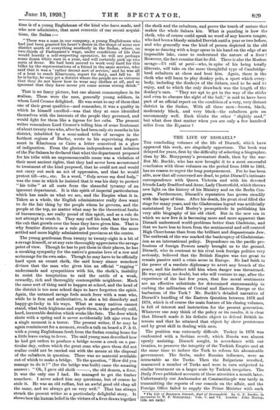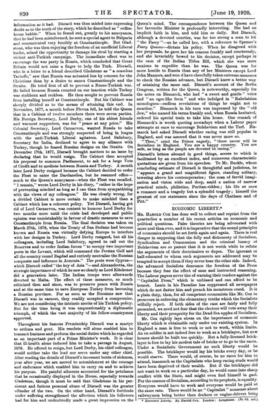THE LIFE OF DLSRAELI.*
THE concluding volumes of the life of Disraeli, which have appeared this week, are singularly opportune. The book was delayed for years, first by the difficulty of selecting a biographer. then by Mr. Monypenny's premature death, then by the war- But Mr. Buckle, who has now brought it to a most successful conclusion with these volumes on the period from 1868 to 1881, has no reason to regret the long postponement. For he has been able, now that all concerned are dead, to print Disraeli's intimate correspondence with Queen Victoria and with his devoted friends Lady Bradford and Anne, Lady Chesterfield, which throws new light on the history of his Ministry and on the Berlin Con- gress. Furthermore, Disraeli's reputation has grown steadily with the lapse of time. After his death, his great rival filled the stage for many years, and the Gladstonian legend was artificially maintained by Lord Morley's promptitude in publishing his very able biography of his old chief. But in the new era in which we now live it is becoming more and more apparent that Disraeli understood world-problems bettor than Gladstone, and that we have less to learn from the sentimental and self-centred High Churchman than from the brilliant and dispassionate Jew. The outbreak of the war marked the bankruptcy of Gladstonian- ism as an international policy. Dependence on the pacific pro- fessions of foreign Powers nearly brought us to the ground. Disraeli, who in contrast to his rival took foreign politics very seriously, believed that the British Empire was too great to remain passive until a crisis arose in Europe. He had faith in the power of a resolute diplomacy to avert any breach of the peace, and his instinct told him when danger was threatened. He was cynical, no doubt, but who will venture to say, after the experience of the last few years, that fine moral sentiments are an effective substitute for determined statesmanship in curbing the militarism of Central and Eastern Europe or the barbarism of the Turk ? Mr. Buckle's detailed narrative of Disraeli's handling of the Eastern Question between 1876 and 1878, which is of course the main feature of his closing volumes, is full of interest and instruction for the present generation. Whatever one may think of the policy or its results, it is clear that Disraeli made it his definite object to defend British in- terests and that he attained that object by sheer persistence and by great skill in dealing with men.
The position was extremely difficult. Turkey in 1876 was confronted with a Serbian revolt, which Russia was almost openly assisting. Disraeli sought, in accordance with our treaties, to preserve the integrity of the Turkish Empire and at the same time to induce the Turk to reform his abominable government. The Serbs, under Russian influence, were as intractable as the Turks. Then the Bulgarians revolted, massacred a number of Turks and were in turn subjected to similar treatment on a larger scale by Turkish irregulars. The Daily New published accounts of these atrocities a month later. Unfortunately our Ambassador at Constantinople was tardy in transmitting the reports of our consuls on the affair, and the Foreign Office failed to supply the Prime Minister with such • The Life of Benjamin Disraeli. Sari of Beaconsfield. By G. E. Buckle. In succession to W. F. Monypenny. Vols. V. and VI. London: John Murray. Wis. net each.'
Information as it had. Disraeli was thus misled into expressing doubt as to the truth of the story, which he described as " coffee- house babble." When he found out, greatly to his annoyance, that he had been misinformed, he sent a special agent to Bulgaria and remonstrated very forcibly at Constantinople. But Glad- stone, who was then enjoying the freedom of an unofficial Liberal leader, seized the opportunity to damage his rival by starting a violent anti-Turkish campaign. The immediate effect was to encourage the war party in Russia, which concluded that Great Britain would not raise a finger to help the Turk. Disraeli, who in a letter to a friend described Gladstone as " a ceaseless Tartu ffe," saw that Russia was actuated less by concern for the Christians than by a desire to annex Constantinople and the Straits. He tried first of all to prevent a Russo-Turkish war. He failed because Russia counted on our inaction while Turkey was stubborn and reckless. He then sought to prevent Russia from installing herself at Constantinople. But his Cabinet was sharply divided as to the means of attaining this end. In November, 1877, a month before Plevna fell, he told the Queen that in a Cabinet of twelve members there were seven parties. His Foreign Secretary, Lord Derby, one of his ablest friends and warmest supporters, was for " peace at any price." His Colonial Secretary, Lord Carnarvon, wanted Russia to take Constantinople and was strongly suspected of being in league with the anti-Turkish Liberal agitators. Lord Salisbury, Secretary for India, declined to agree to any alliance with Turkey, though he feared Russian designs on the Straits. On December 17th, 1877, Disraeli brought matters to an issue by declaring that he would resign. The Cabinet then accepted his proposal to summon Parliament, to ask for a large Vote of Credit and to mediate between Russia and Turkey. A month later Lord Derby resigned because the Cabinet decided to order the Fleet to enter the Dardanelles, but he resumed office— much to the Queen's annoyance—when the Fleet was recalled. " I remain," wrote Lord Derby in his diary, " rather in the hope of preventing mischief as long as I can than from sympathising with the views of my colleagues." He was clearly wrong, for a divided Cabinet is more certain to make mischief than a Cabinet which has a coherent policy. Yet Disraeli, having got rid of Lord Carnarvon, was content to humour Lord Derby for two months more until the crisis had developed and public opinion was unmistakably in favour of drastic measures to save Constantinople from Russia. The final decision was taken on March 27th, 1878, when the Treaty of San Stefano had become known and Russia was virtually defying Europe to interfere with her designs in Turkey. Lord Derby resigned, but all his colleagues, including Lord Salisbury, agreed to call out the Reserves and to order Indian forces " to occupy two important posts in the Levant, which will command the Persian Gulf and all the country round Bagdad and entirely neutralise the Russian conquests and influence in Armenia." The posts were Cyprus— which Disraeli called " the key of Asia "—and Alexandretta, the strategic importance of which he saw as clearly as Lord Kitchener did a generation later. The Indian troops were afterwards diverted to Malta. The effect of these measures, so much criticized then and since, was to preserve peace with Russia and at the same time to save European Turkey from becoming a Russian province. For as soon as the Russians saw that Disraeli was in earnest, they readily accepted a compromise. We are not considering the intrinsic merits of his Turkish policy. But for the time being it was unquestionably a diplomatic triumph, of which the vast majority of his fellow-countrymen approved.
Throughout his famous Premiership Disraeli was a martyr to asthma and gout. His resolute will alone enabled him to transact business and perform the social duties which he regarded as an important part of a Prime Minister's work. It is clear that ill-health alone induced him to take a peerage in August, 1878. He offered to resign, but Lord Derby, his chief colleague, would neither take the lead nor serve under any other chief. After reading the details of Disraeli's incessant bouts of sickness, year after year, we are moved to astonishment at the courage and endurance which enabled him to carry on. and to achieve his purpose. His painful ailments accounted for the petulance that he occasionally displayed in the House, especially towards Gladstone, though it must be said that Gladstone in his per- sistent and furious personal abuse of Disraeli was the greater offender of the two. On the other hand, Disraeli's fortitude under suffering strengthened the affection which his followers had for him and undoubtedly made a great impression on the Queen's mind, The correspondence between the Queen and her favourite Minister is profoundly interesting. She had an implicit faith in him, and told him so daily. But Disraeli, although a devoted courtier, was far too strong a man to let " the Faery "—as he called her, with a reference to Spenser's Faery Queene—dictate his policy. When he disagreed with her proposals, he gave her his reasons frankly and courteously, and she invariably bowed to his decision, except perhaps in the case of the Indian Titles Bill, which she was more anxious to expedite than he was. The Queen was far more hostile to Russia than any of her Ministers except Lord John Manners, and wou d have cheerfully taken extreme measures to check the Russian advance, but Disraeli knew a better way of attaining the same end. Disraeli's account of the Berlin Congress, written for the Queen, is noteworthy, especially for the notes on Bismarck, who had " a sweet and gentle " voice and " an ogre-like form " and who indulged in " Rabelaisian monologues—endless revelations of things he ought not to mention." Bismarck in his turn was impressed by the " old Jew," who named his terms frankly and, when Russia hesitated, ordered his special train to take him home. One remark of Bismarck's is worth quoting nowadays when a Labour paper attempts at once to encourage Bolshevism and the Turf. Bis- marck had asked Disraeli whether racing was still popular in England, and was assured that it was never more so.
" Then," cried the Prince eagerly, " there never will be Socialism in England. You are a happy country. You are safe, as long as the people are devoted to racing."
Disraeli's letters abound in good things, access to which is facilitated by an excellent index, and numerous characteristic quotations are given from his speeches. To Mr. Buckle, whose concluding estimate of Disraeli is thoughtful and judicious, he " appears a grand and magnificent figure, standing solitary, towering above his contemporaries ; the man of fervid imagi- nation and vision wide and deep, amid a nation of narrow practical minds, philistine, Puritan-ridden ; his life at once a romance and a tragedy but a splendid tragedy ; himself the greatest of our statesmen since the days of Chatham and of Pitt."







































 Previous page
Previous page